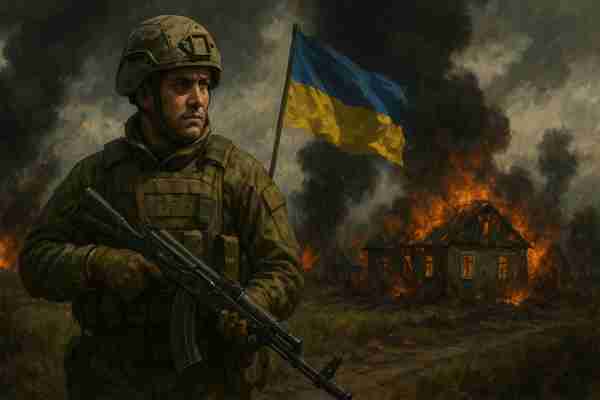The summer sun scorched the land near Sumy as Captain Mykhailo Dronov, commander of a Ukrainian mechanized company, gripped his binoculars, scanning the horizon. Somewhere in the fields and village alleys, Russian assault units were approaching. Behind him lay the village of Novenke, where not only his soldiers but also locals who refused to leave still remained. Mykhailo knew: this piece of land had to be defended at all costs. In recent months, the front hadn’t stood still. The Russians intensified their offensive since March, starting with probing attacks, then deploying tanks, infantry, and kamikaze drones. Every night brought dull thuds and explosions — sometimes near, sometimes distant. But by June, it was clear: this was no ordinary raid. It was part of a larger plan. On June 2nd, at six in the morning, the enemy entered Kostiantynivka. Mykhailo heard it over the radio: “Kostyantynivka has fallen. Repeat, the enemy is in the center.” It was the first major loss in the Sumy direction in a year and a half. From that moment, Mykhailo’s soldiers knew — they were next. Every evening, he gathered his men: “Positions reinforced, anti-tank systems loaded, drones in the sky. We stand to the end. For our families, our land, our children.” It wasn’t for show. He had grown up in Kharkiv, now suffering from bombardments, and his wife and son were sheltering in Kyiv. A week after Kostiantynivka fell, Russian reconnaissance intensified — drones flew overhead adjusting artillery. The attack began at night, as expected — an hour-long barrage followed by armored groups. Mykhailo’s unit repelled the first wave. Then the second. But by morning, the enemy was entrenched on the village edge. He ordered: “Retreat to the forest strip. Leave mines, booby traps, let the bomber drones do their work. We’ll hold the southern ridge.” It was risky. But it worked. Russian infantry entered the 'empty' village — only to be hit by devastating fire, mines, and airstrikes. By evening, the village was back under Ukrainian control. Losses were heavy, but morale soared. Meanwhile, news repeated Putin’s words: “We will not stop until Moscow’s terms are accepted.” Mykhailo turned off the radio. He knew those words came at a cost — and it was paid not by generals, but by men like him. But he wasn’t giving up. He knew: this wasn’t the last battle. But it wasn’t a lost one either.
Fire in the East

Published : 16.07.2025
